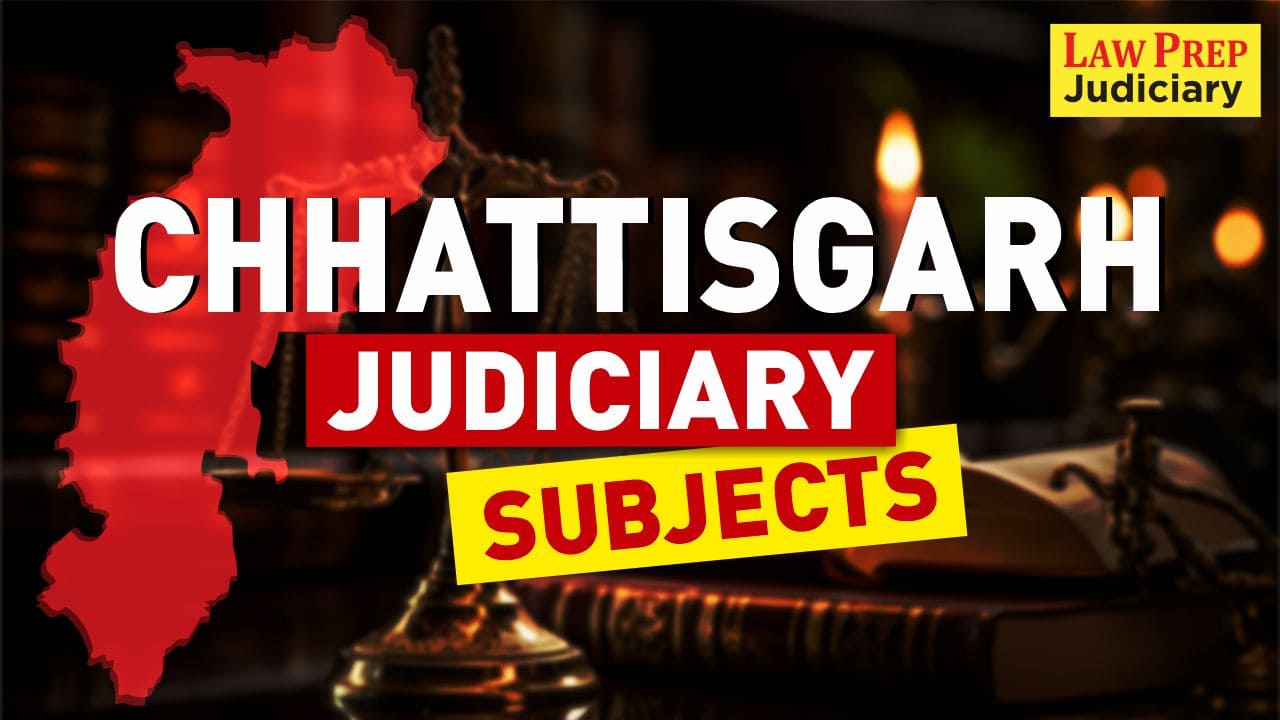Cracking the Chhattisgarh Judiciary exam starts with knowing your subjects inside out.
It’s not just about mugging up laws; it’s about understanding what to study, how to approach it, and which topics can make or break your score.
From core acts like CPC and BNS to tricky translation papers, each subject has its own weight. This blog breaks it all down so you prep smart, not just hard.
Let’s get into it.
Overview of Chhattisgarh Judicial Services Exam
The Chhattisgarh Judicial Services exam, conducted by the Chhattisgarh Public Service Commission (CGPSC), selects Civil Judges (Junior Division) for the state’s subordinate courts. This annual exam has three stages: a preliminary objective test, a descriptive mains exam, and a final viva voce.
Candidates must have a law degree from a recognized university and be between 21 and 35 years old, with age relaxations for reserved categories. In 2025, there are 57 vacancies, and the pay ranges from ₹77,840 to ₹1,36,520.
The main goal of Chhattisgarh Judicial Services is to recruit qualified individuals who uphold the rule of law and deliver justice efficiently. Civil Judges handle civil, criminal, and revenue cases, ensuring justice and social harmony at the grassroots level. Besides job security and career growth, this role offers the chance to serve society and protect constitutional values.
Chhattisgarh Judiciary Exam Subjects: List
| Prelims Subjects | |
| Bharatiya Nyaya Sanhita, 2023 | Code of Civil Procedure (CPC) |
| Bharatiya Nagarik Suraksha Sanhita, 2023 | Bharatiya Sakshya Adhiniyam, 2023 |
| Constitutional Law | Transfer of Property Act |
| Contract Act | Limitation Act |
| Court Fees Act | Specific Relief Act |
| Registration Act | Negotiable Instruments Act, 1881 |
| Chhattisgarh Rent Control Act, 2011 | Chhattisgarh Excise Act, 1915 |
| Chhattisgarh Land Revenue Code | General Knowledge of Chhattisgarh |
| Mains Subjects | |
| Civil Judgment Writing | Criminal Judgment Writing |
| Translation (English to Hindi) | Translation (Hindi to English) |
Must check Chattisgarh Judiciary Previous Year Papers
Subjects in Chhattisgarh Judiciary Prelims
1. Bharatiya Nyaya Sanhita, 2023
This subject covers the foundational principles of criminal law, including offenses against the human body, property, and state, as well as important topics such as criminal conspiracy, abetment, attempt, punishments, and exceptions.
2. Code of Civil Procedure (CPC)
Candidates are tested on the processes and procedures of civil courts, including jurisdiction, pleadings, written statements, how decrees and orders are passed, the concept of res judicata, and the execution of judgments.
3. Bharatiya Nagarik Suraksha Sanhita, 2023
This section focuses on criminal procedural law, addressing subjects like arrest, bail, investigation, charge sheet filing, issuance of warrants and summons, summary trials, appeals, and revisions.
4. Bharatiya Sakshya Adhiniyam, 2023
The law of evidence is covered here, including relevancy of facts, admissibility of oral, documentary, and digital evidence, as well as presumptions, estoppel, and examination of witnesses.
5. Constitutional Law
Topics include the fundamental rights and duties enshrined in the Constitution, directive principles, detailed structure and functions of the Indian judiciary, and provisions regarding emergencies.
6. Transfer of Property Act
This Act is crucial for civil cases related to property and includes subjects such as sale, mortgage, lease, exchange, gift, actionable claims, and easements.
7. Contract Act
Candidates must understand the essentials of a valid contract, various types of contracts (void, voidable, illegal), what constitutes a breach, and remedies available for breach.
8. Limitation Act
This part of the syllabus deals with the computation of limitation periods for filing cases, as well as exceptions and special cases pertaining to the limitation of actions.
9. Court Fees Act
The regulation of court fees, including how payments are made, available exemptions, and scenarios for refund of court fees, is assessed here.
10. Specific Relief Act
This law covers specific performance of contracts and the grant of temporary and perpetual injunctions.
11. Registration Act
Candidates must be familiar with the law and procedures for registering various documents, as well as the effects and consequences of non-registration.
12. Negotiable Instruments Act, 1881
Key to commercial transactions, this covers promissory notes, bills of exchange, cheques, and provisions related to the dishonor of cheques.
13. Chhattisgarh Rent Control Act, 2011
This state-specific law governs the regulation of rent agreements, the process of eviction, and defines the rights and duties of both landlords and tenants.
14. Chhattisgarh Excise Act, 1915
Candidates are required to know the laws relating to the manufacture, sale, and distribution of liquor in the state, along with penalties and offences.
15. Chhattisgarh Land Revenue Code
This subject focuses on land records, revenue administration, and the rights and duties of landowners in Chhattisgarh.
16. General Knowledge of Chhattisgarh
Apart from law, candidates are examined on their knowledge of Chhattisgarh’s history (including state formation and major movements), culture (tribes, traditions, festivals, folk dances), geography (natural resources, wildlife sanctuaries), and current affairs, including important government schemes and recent developments.
Check the official Chhattisgarh Judiciary Results 2025.
Subjects in Chhattisgarh Judiciary Mains Exam
According to the latest official Chattisgarh Judiciary syllabus, the subjects for the mains exam are:
1. Judgment Writing (Civil)
Candidates must demonstrate the ability to frame issues and write reasoned judgments in civil cases. This section assesses how well you can identify key legal and factual points, apply relevant statutes, and produce explicit, logical judgments for civil disputes.
2. Judgment Writing (Criminal)
In this section, the focus is on framing charges and drafting judgments in criminal cases. It evaluates your skill in accurate charge formulation and coherent legal reasoning for criminal matters.
3. Translation (English to Hindi)
This part tests your ability to translate legal documents and terminologies from English to Hindi accurately, emphasizing the correct and contextually appropriate use of legal vocabulary in Hindi.
4. Translation (Hindi to English)
Here, candidates are required to translate legal content from Hindi to English. The primary skills assessed are accuracy, clarity, and the proper understanding of formal legal English expressions.
Know the Chhattisgarh Judiciary age limit 2025.
How to Prepare for Subjects in Chhattisgarh Judiciary Exam?
1. Understand the syllabus thoroughly:
Start by reading the official syllabus for both prelims and mains. This helps you avoid wasting time on irrelevant topics.
2. Divide your prep into phases:
Begin with concept-building, move to application (practice questions), and then shift to revision. Use monthly targets to stay on track.
3. Prioritize the law subjects first:
Focus on bare acts for each subject, like IPC, CrPC, CPC, and Evidence Act. Read them regularly and highlight key sections.
4. Make concise notes for revision:
Write short summaries, flowcharts, and case law pointers for each subject. These notes are your lifesavers before the exam.
5. Practice past year papers:
Solving previous years’ papers is essential to understand the question pattern and the weightage of different subjects in Chhattisgarh Judiciary exam.
6. Work on language papers weekly:
For Hindi and English, practice one essay, one precis, and one translation every week. Focus on clarity, grammar, and legal relevance.
7. Stay updated with current affairs:
Read newspapers, legal magazines, and judiciary current affairs PDFs to cover the GK part of the Prelims.
8. Revise regularly and smartly:
Use the 7-3-1 revision rule: review your notes 7 days, 3 days, and 1 day before the exam for better retention.
9. Take mock tests seriously:
Attempt timed mocks to build exam temperament. Analyze your performance and improve weak areas.
10. Maintain balance and consistency:
Avoid burnout. Study smart, take breaks, and keep a consistent schedule to stay motivated till the finish line.
Read about the Chhattisgarh Judiciary eligibility criteria 2025.
Commonly Repeated Subjects in Chhattisgarh Judiciary Exam
Some subjects in Chhattisgarh Judiciary exam show up year after year in both prelims and mains. Knowing these can help you focus your energy where it matters most.
1. Indian Penal Code (IPC):
High-scoring and frequently asked; focus on chapters like General Exceptions, Offences Against Body, and Property.
2. Code of Civil Procedure (CPC):
Often repeated in both prelims and mains, especially questions on jurisdiction, orders, and decree execution.
3. Indian Evidence Act:
Concepts like admissibility, burden of proof, and witness types appear almost every year.
4. Code of Criminal Procedure (CrPC):
Look out for regular questions on arrest, bail, charge framing, and trial procedures.
5. Indian Constitution:
Especially Articles related to Fundamental Rights, Judiciary, and Directive Principles.
6. Contract Act & TPA:
Repeated mostly in mains, with conceptual and application-based questions.
Learn more about Chattisgarh Judiciary Notification
Toughest Subjects in Chhattisgarh Judiciary Exam
Some subjects tend to trip up even the most serious aspirants. Here’s a breakdown of the most challenging ones, and how you can master them.
1. CPC (Code of Civil Procedure)
- Why it’s tough: Procedural depth and complex language
- How to tackle: Start early, focus on sections + orders, make flowcharts, and revise regularly
2. Evidence Act
- Why it’s tough: Concept-heavy and confusing for beginners
- How to tackle: Learn with examples, watch case law videos, and practice application-based questions
3. CrPC (Code of Criminal Procedure)
- Why it’s tough: Timeline-based procedures are hard to memorize
- How to tackle: Create visual timelines and link sections to real-life legal scenarios
4. Hindi & English Papers
- Why they’re tough: Often neglected; many struggle with legal writing
- How to tackle: Practice weekly essays and precis; get feedback; learn basic legal vocabulary
Pro Tip: Don’t just “read” these subjects. Teach them aloud, discuss with peers, and solve PYQs for better retention.
Best books for Chhattisgarh Judiciary exam preparation.
Common Mistakes to Avoid in Chhattisgarh Judiciary Subject Preparation
Even sincere aspirants fall into common traps. Avoiding these mistakes can save you time and improve your overall prep quality.
1. Skipping Bare Acts:
Many students rely solely on guidebooks. But bare acts are your primary source; read them daily.
2. Neglecting Language Papers:
Hindi and English papers hold equal weight in Mains. Ignoring them can cost you your rank.
3. Overloading with too many books:
Using 4 books per subject doesn’t make you smarter. Stick to 1-2 trusted sources and revise thoroughly.
4. Ignoring current affairs:
Prelims have GK and legal news components. Relying only on static GK is a big no-no.
5. No revision schedule:
Reading once isn’t enough. Regular revision (weekly and monthly) is what locks in your learning.
6. Skipping mock tests and PYQs:
Without testing yourself, you’ll never know your weak spots. Practice under exam-like conditions is a must.
Also checkout Chattisgarh Judiciary Application Form
Chhattisgarh Judiciary Preparation Books
Below are some of the most recommended books:
| Book Name | Author |
| Guide for Chhattisgarh Judicial Services (Mains) Examination | Rajiv Ranjan Sahay |
| The Law of Evidence | Batuk Lal |
| Civil Procedure with Limitation Act (Latest Edition) | C.K. Takwani |
| The Transfer of Property Act (Bare Act) | Poonam Pradhan (LexisNexis) |
| Indian Penal Code | K.D. Gaur |
| Contract – I with Specific Relief Act (Latest Edition) | Dr. R.K. Bangia |
| Code of Criminal Procedure | R.V. Kelkar |
FAQs About Chhattisgarh Judiciary Subjects
Subjects are mostly the same, but prelims is MCQ-based while mains tests judgment writing, and translation.
Yes. State-specific laws like the Chhattisgarh Land Revenue Code and Excise Act are part of the syllabus, especially important in Prelims and Mains.
The core subjects in Chhattisgarh Judiciary exam usually stay the same, but it’s smart to check the latest official notification for updates.
Yes, GK of Chhattisgarh is part of the prelims. Prepare current affairs, history, and local governance topics.
Yes, language papers hold 100 marks each in mains and are often the deciding factor. Practice translations weekly.
CPC, CrPC, and Evidence Act are tough due to complexity. Use flowcharts, visual notes, and case examples for better understanding.
There are four descriptive papers: Civil Judgment, Criminal Judgment, Hindi to English translation, and vice versa, each carrying 100 marks.


